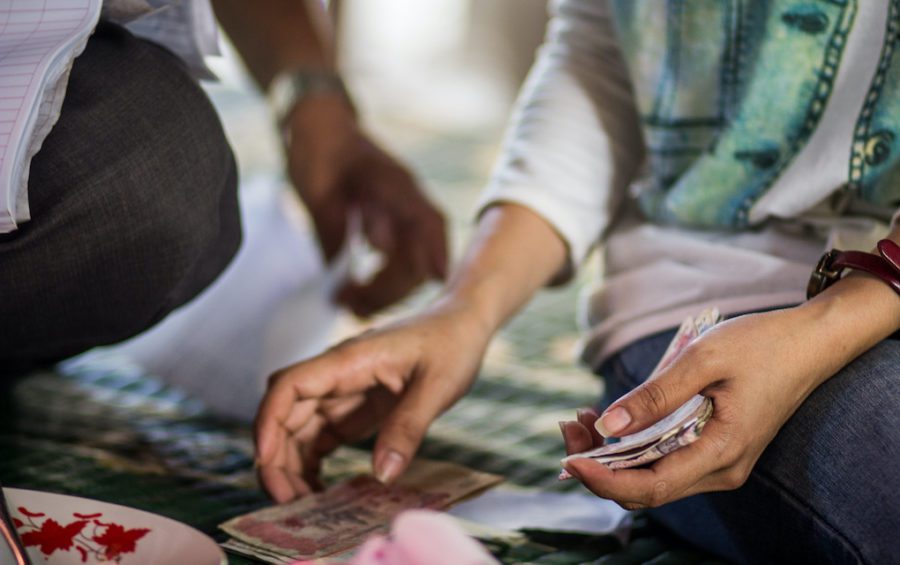An investment firm run by a daughter and niece of two deputy prime ministers is suing ex-board members who it claims cheated the company out of $20 million — though some customers say they want the company to take the responsibility for the loss of their investments.
A financial expert, meanwhile, said the company’s operations had seemed questionable for some time due to it advertising consistent returns from foreign exchange trading, and even suggested that it “had the hallmarks of a ponzi scheme.”
Bun Kiririth, a company representative, declined to comment, saying he was busy.
The company, GoldFX Investment, issued a notice last week about suspending its operations and calling on its customers to join its lawsuit against the three ex-board members.
The notice says the company rejects all accusations against it in the matter, and says it is a victim just like its clients.
“Trading operations have been at a loss, and some posts on social media have been accusing, blaming or lying that the company is making excuses and avoiding compensation to clients,” the notice says.
“The company announces and asks all clients who think they’ve lost [money] in the incident to contact the company or join with the company with the aim of taking legal action to demand and get back what was lost.”
GoldFX, a registered financial investment company, advertises “diversified Forex investments” on its trading platform with a minimum $1,000 account.
The company is chaired by Ke Suonsophy, “the spouse of His Excellency Sar Sokha, [a] Member of Parliament,” according to the company website. Suonsophy is also the daughter of Deputy Prime Minister Ke Kim Yan, a military general, while Sokha is the son of Deputy Prime Minister Sar Kheng, the interior minister.
Its managing director is Sar Channet, “Wife of very successful businessman Mr. Ly Sopheark (Vice President of LY Hour Group),” the website says. She is also a niece of Interior Minister Kheng.
Ly Dane, an investor in the company since 2019, said her first two-year account was just about to expire, so she had put in another $5,000 earlier this year.
She had made as much as $600 a month from GoldFX, which she trusted as it was a registered investment company.
But now all her money had disappeared from her accounts, she said.
“All money in their accounts was deleted. It wasn’t because of a trading loss, it was like burning accounts. It’s completely gone,” she said.
She rejected the company’s notice claiming to also be a victim in the matter and that the losses were the responsibility of individuals who had left the company.
“If we agree to sue the third party that cheated the company, it means we accept that the company is also the victim. But in fact, what we have is an agreement with the company, not with the third party,” Dane said.
She said she was disappointed with the company asking its clients to file a lawsuit against people they had never known. In doing so, the company had made her think it is trying to avoid responsibility for the lost money, she said.
Siek Kimsal, a cable technician, said he had invested $5,000 in a two-year account in April 2019. This money had also disappeared, he said.
In the early days, he made as much as $300 per month from the foreign currency investments, but last year the earnings were down to about $30 a month or sometimes negative, he said.
He said he doesn’t know clearly how currency-trading investment works. He just invested money and let the company take care of the trading, he said.
His brother-in-law, who had been a salesperson at the company, had recommended the investment, he said.
His family had lost about $30,000 total in the scheme, he said.
Kimsal said he also disagreed with the company asking its investors to file a lawsuit against a third party, since their contracts were with the company.
“It’s very sad, brother. I did not expect something like this to happen with money we’ve been trying to save for a long time. I thought if something happened, the company would take responsibility, and that would be OK. But now the company seems to be unwilling to take responsibility. So it’s difficult,” he said.
Another investor, who declined to be named, said many clients seemed well-educated or young, and would not simply accept their losses.
“It may not be quiet and easy like in previous times when a [microfinance] institution cheated money from farmers by buying their land at 10 percent [of the land price]. It’s not easy like that. So we can’t accept what is injustice,” the investor said.
Stephen Higgins, founder of Mekong Strategic Partners and former CEO of ANZ Royal Bank, said he was not surprised by GoldFX’s troubles as it has been “obvious for a long time that something wasn’t right.”
“It was advertising consistent returns from FX trading, and that’s just not possible unless you’re a large bank who is able to make a spread as an intermediary,” Higgins said. “It had the hallmarks of a ponzi scheme where cash from new investors is used to provide returns to existing investors.”
“I fear that it may not be the only such firm operating in Cambodia with this type of business model,” he added.













